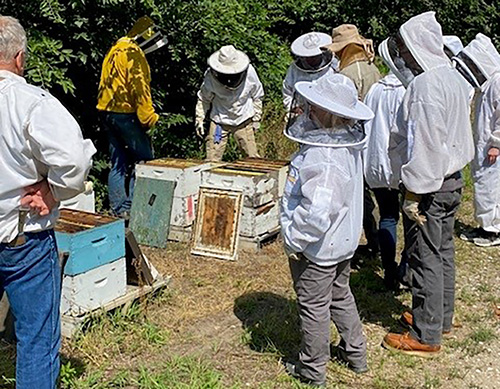NORFOLK, Neb. – When it comes to beekeeping, the learning curve is steep.
Matt Lance, owner and operator of Lance Honey Farms, told those attending the first Norfolk Open Apiary educational event at Northeast Community College that there are a lot of variables when it comes to beekeeping.
A person can do everything correctly and still lose his or her entire colony of bees, depending on the year. Then again, a person can do nearly everything wrong and have a record year for honey harvested, again depending on the year.
Lance was the guest lecturer during the educational event at Northeast on Saturday, Aug. 17. He operates more than 350 colonies and supplies beekeepers across the state with nucs and queens that he raises. Northeast cosponsored the event with the Nebraska Beekeepers Association, drawing attendees from all over the state.
After the lecture, participants went to Northeast’s urban farm and examined some hives that are kept there. In the future, Northeast may offer a course on beekeeping. Bees are important because they help to pollinate plants. They can help new plant hybrids to occur naturally through cross-pollination. Bees also produce products such as honey and beeswax.
Some of the participants were new to beekeeping, along with others who have decades of experience. And while beekeeping has always been a topic where knowledge pays, it became more complicated when Varroa mites arrived in the United States in the late 1980s.
Fortunately, a lot of scientific research has been conducted and most beekeepers are happy to share their knowledge. They enjoy reading and discussing bees.
“That’s what events like this are for,” Lance said. “Hopefully, through the association, your membership adds value and helps beekeepers across the state.”
When a beekeeper who doesn’t treat has his or her colonies succumb, no matter what a good beekeeper is doing, the bees will go next door. When those bees return, they will bring the viruses and mites with them. As a beekeeping community, if everyone tries to follow the best practices, everyone benefits.
There are a variety of methods to treat mites and depending on the time of year, temperature and other factors, the effectiveness varies. And depending on the treatments, the steps are repeated.
“I always suggest, take a quality class,” Lance said.
There are free classes on YouTube that can help those interested gain information, but there is no substitute for experience and in-person classes where participants can ask questions, Lance said.
Lance teaches Intro to Beekeeping courses in-person, over streaming services and at Central Community College. Some of the more experienced beekeepers suggest that “newbees” -- those who are new or have had their bees less than a year – take biology of beekeeping and learn about the equipment. Then by joining an association, they can learn more about specific topics.
Lance said the time and investment that beekeepers put into their colonies would make honey unaffordable if true markets existed.
To learn more about the Nebraska Beekeepers Association, click https://www.nebraskabeekeepers.org/plans-pricing .
Checking Hives
Attendees check the bee hives at the Northeast Community College Urban Farm during the first Norfolk Open Apiary educational event that Northeast cosponsored with the Nebraska Beekeepers Association on Saturday, Aug. 17. (Northeast Community College)
###

